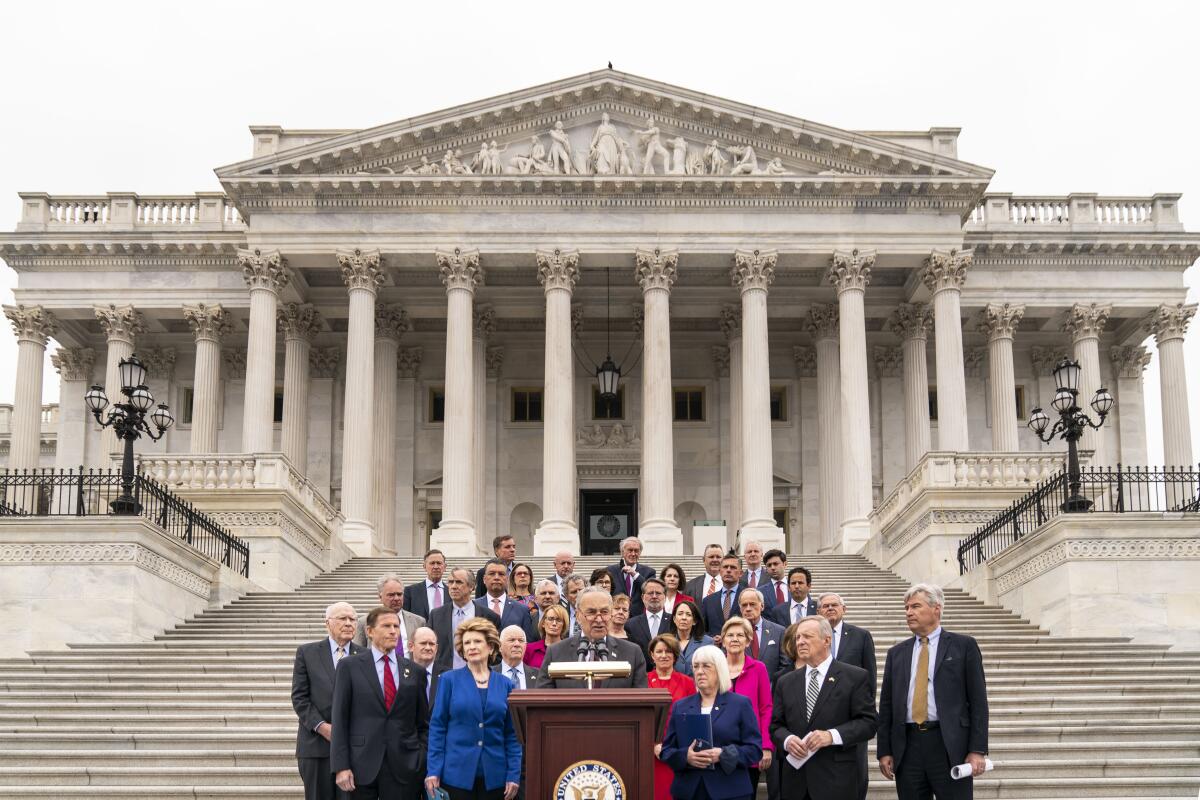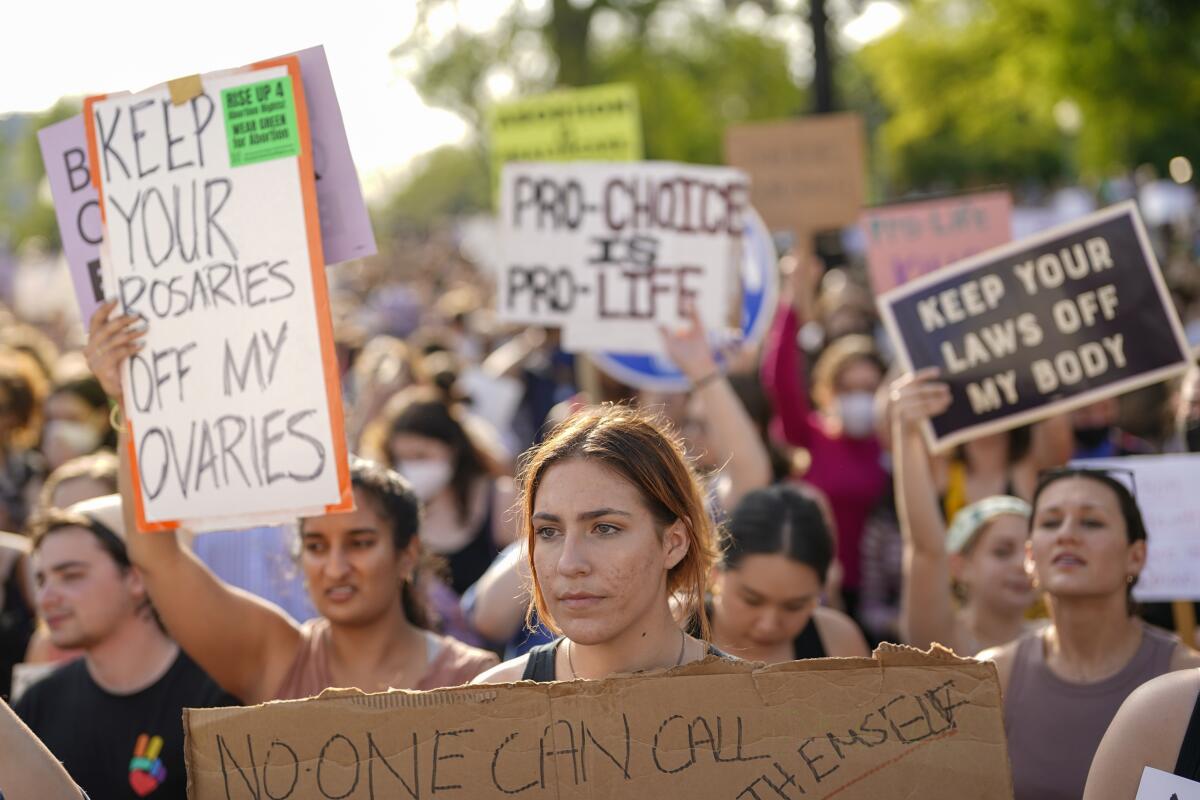Democrats promise to fight for abortion rights but have few options

WASHINGTON — Democrats on Capitol Hill were spitting fire Tuesday in the wake of the leak of a Supreme Court draft ruling overturning abortion rights, but acknowledged their hands are tied unless voters deliver them a strong majority in Congress this fall.
“It is hard not to feel angry, troubled and deeply disturbed about what overturning Roe would do to women across America,” said Senate Majority Leader Charles E. Schumer (D-N.Y.), surrounded by Senate Democrats on the steps of the Capitol, staring down the Supreme Court building. “The decision would be an abomination, an abomination; one of the worst ever in modern history.”
The draft decision to undo 50 years of abortion rights and the unprecedented leak of a Supreme Court draft opinion decision rattled Capitol Hill. But it did nothing to immediately alter abortion politics in the closely divided Senate, which is narrowly controlled by Democrats. There are not enough senators who support abortion rights to overcome a filibuster or, as of now, to create a 51-vote majority.
Democrats are left with no tools in their toolbox to combat the Supreme Court’s expected decision besides holding out hope that the coming state abortion bans — 26 states are certain or likely to ban abortion if given the chance — will galvanize voters to deliver them overwhelming majorities in Congress this fall.
“The reality is that we have to organize and we have to win elections,” said Sen. Tina Smith (D-Minn.). “If we win the election and we have a majority in the Senate that we can work with, then we can talk about issues like the filibuster and other steps that we can take to reclaim the courts.”
Even if the fall of Roe is the powerful motivating political force Democrats hope it to be, it would be months until the next Congress would convene in January and would be able to do something about it, such as enact a federal law authorizing abortion rights.
And even so, Democrats would need 60 votes in the Senate to overcome a GOP filibuster — an all but insurmountable figure given the mixture of states that will hold Senate elections this fall — or 50 Democrats who are willing to overturn the filibuster to save abortion rights.

Democrats warned that the court, by taking apart the underpinnings of the Roe decision, will undermine other privacy-based rulings, such as those establishing the right to use contraception, same-sex marriage and interracial marriage. They said the growing threat would provide additional pressure to undo the legislative filibuster, or the 60 votes needed to enact most legislation.
“There is a powerful dynamic to modify the filibuster in a way that permits us to move forward in protecting reproductive rights,” said Sen. Richard Blumenthal (D-Conn.).
Sens. Susan Collins (R-Maine) and Lisa Murkowski (R-Alaska), both of whom voted for justices appointed by Donald Trump who were thought to support the draft ruling, expressed surprise about the draft opinion. Collins said the ruling would be “completely inconsistent with what Justice [Neil M.] Gorsuch and Justice [Brett M.] Kavanaugh said in their hearings and in our meetings in my office.”
At the time of Kavanaugh’s contentious confirmation hearing, Collins — who was the 50th vote for confirmation — made well-circulated comments that she didn’t believe Kavanaugh would overturn Roe.
Murkowski indicated that she, too, was told during the confirmation process that Roe was settled law.
“If in fact this draft is where the court ends up ... it has rocked my confidence in the court. That is because I think there were some representations made with regard to precedent and settled,” she said. “Comments were made to me and others about Roe being settled.”
In hopes of keeping political pressure and a spotlight on the issue, Schumer promised the Senate would vote on a bill to establish abortion rights nationwide. It is expected to be a slightly modified version of the Women’s Health Protection Act.
Democrats framed the original bill as “codifying Roe,” though it would go further by prohibiting states from enacting restrictions on abortion before a fetus is viable outside the womb, or about 24 weeks, and in post-viability cases when the patient’s life or health is at risk.
It would also curtail GOP efforts to enact roadblocks to abortion access in the states by prohibiting policies such as waiting periods, ultrasound requirements or demands that abortion providers have admitting privileges at a nearby hospital. It is not yet clear what changes Democrats may make to the language.
When the Senate held its first vote on the measure in February, only 46 of the 50 Democrats supported the procedural vote (although three more were expected to have supported it if they had not been absent).

On a repeat vote, “there’s no evidence to think that those votes are going to succeed,” Smith said. “But at least people will know where every single member stands.”
Sen. Joe Manchin III (D-W.Va.), the only Democrat in the Senate who opposed the procedural vote in February, refused on Tuesday to answer questions about the ruling. When asked about West Virginia’s so-called trigger law, which would automatically ban all abortions except those necessary to save the woman’s life if Roe falls, Manchin said he was not familiar with it.
“I’m not the legislature in West Virginia,” he said.
Sen. Bob Casey (D-Pa.), a longtime opponent of abortion rights who said in February that he would support starting debate on the bill but remained uncommitted on the bill’s contents, said he has “serious concerns about what overturning almost 50 years of legal precedent will mean for women in states passing near or total bans on abortion.”
Murkowski and Collins, both of whom have bucked their party to support abortion rights in the past, opposed the measure in February out of concern that it went too far beyond codifying Roe. Collins expressed particular concern that the bill repealed conscience protections for healthcare workers who oppose abortion. They expressed support for a slimmer effort that would more narrowly establish a federal legislative right to abortion.
The bill’s author, Blumenthal, said he is open to conversations about modifying the bill but indicated little wiggle room. “Any senator who is pro-choice and wants to protect reproductive rights should vote for the Women’s Health Protection Act,” he said. “Exemptions or loopholes or gaps are exactly what the states will exploit to pass measures like [Texas’] SB 8 with its bounty-hunter provision,” he added, referring to the Texas six-week abortion ban that gives citizens the authority to pursue people who have helped a person get an abortion.
Most Republicans, meanwhile, refused to say much about the content of the draft ruling, instead focusing on the unprecedented nature of the leak out of the court. Even Senate Minority Leader Mitch McConnell (R-Ky.), who has repeatedly said that his moves to ensure a conservative court majority are among his most proud work, was reluctant to spike the football before the draft was an official Supreme Court decision.
Upon repeated questions from reporters on Tuesday, he said: “You need, it seems to me, excuse the lecture, to concentrate on what the news is today — not a leaked draft but the fact that the draft was leaked.”
More to Read
Get the L.A. Times Politics newsletter
Deeply reported insights into legislation, politics and policy from Sacramento, Washington and beyond. In your inbox three times per week.
You may occasionally receive promotional content from the Los Angeles Times.











